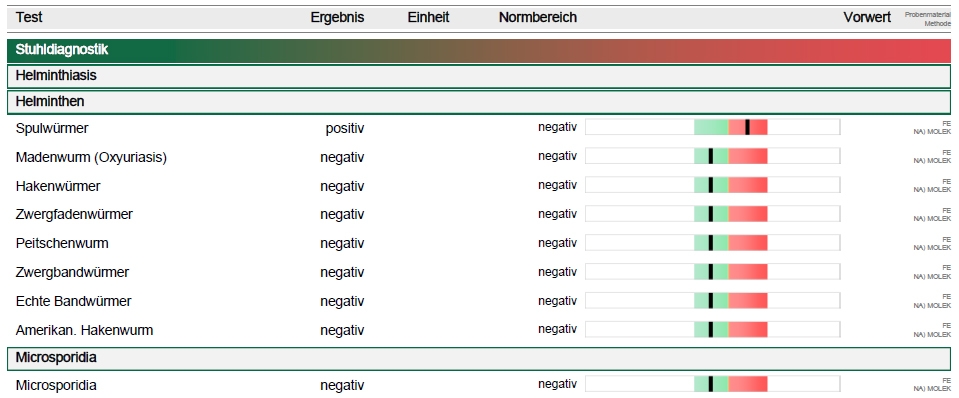
Topic of the month: Intestinal parasitoses
Our topic today is intestinal parasitoses. “Excuse me, parasites? What’s that all about? They only exist in the tropics, not here!!!” At least that’s what most people think, but you’re (unfortunately) wrong. Parasitic pathogens are all around us, omnipresent, so to speak. Today, we dedicate ourselves to the topic “Parasites in the intestine”, which can lead or contribute to a number of symptoms.
Key Message for Short Readers:
Parasitoses also exist in our latitudes and are not a rarity. They are just not looked for enough anymore. The level of knowledge regarding these pathogens in the medical community is, let’s put it nicely, optimizable. In the intestinal tract, they can lead to numerous symptoms. Especially severe courses e.g. of a SIBO, of an irritable bowel syndrome, of food allergies or intolerances, histamine-associated complaints and persistent leaky gut constellations, which do not respond to a naturopathic classical therapy, among others, should lead to closer diagnostics in this area. My therapy is usually a combination of naturopathy and conventional medicine.
Table of contents
Background on intestinal parasitoses
Intestinal problems have been increasing in many people in recent years. Often, these have already been clarified in detail by conventional medicine by means of endoscopies, laboratory chemical examinations and now and then also by means of breath tests (note: whereby the (most important) breath test for a SIBO of the methane or hydrogen type is usually missing here).
However, less and less or hardly any thought is given to the possibility of infection with parasites, which can also cause pathological changes in the intestine. This can be seen, among other things, in the decline in prescriptions for parasitic medications within the last few decades. Whereas 2-3 decades ago it was still common for doctors, especially in children and also family doctors to prescribe a drug for parasite therapy in the case of intestinal complaints, depending on the clinic, this is hardly encountered nowadays.
Medical school, residency and parasites
I am a specialist in internal medicine and gastroenterology and have completed most of my training in a university hospital. I was taught almost nothing about this during my training as a specialist in general internal medicine and also afterwards during my training period as a specialist in gastroenterology. It played a strongly subordinate or no relevant role.
I have over time acquired my knowledge by myself from conventional medical textbooks by self-study, by advanced training and by reading many medical articles. Therefore, as an affected person, one can unfortunately not expect that these cause areas of medicine are considered or clarified as standard within the framework of standard care. In Germany, these diseases are often treated more intensively by tropical medicine specialists and infectiologists.
What is meant by parasitism anyway?
Parasitism defines the relationship between two species in which the parasite exploits a host for its own benefit, harming the host but usually not killing it. On the other hand, one still distinguishes the symbiosis, here a mutual benefit of the coexistence for both species is present, as well as the commensalism. In the latter case, the benefit of coexistence is only on the side of the so-called commensal, but the host is not harmed in the process, unlike parasitism.
The transition from symbiosis to commensialism and parasitosis is often fluid:
Some intestinal parasites reside in the intestinal lumen and food pulp and take a portion of the food without harming the afflicted individual, much like typical intestinal bacteria. Here, the pathogen then behaves more as a commensal. Likewise, a large number of bacteria, viruses and fungi live in our intestines without causing us any harm. Some species of bacteria have even become very important for our survival and perform necessary tasks to maintain our well-being.
An intact immune system in the intestine is important. Approximately three quarters of our immune system is located in the intestine (MALT = Mucosa Associated Lymphatic Tissue). In this context, secretory IgA, an antibody located on the mucosa, has extremely important tasks in addition to other mechanisms for the defense against pathogens. We determine this in the course of stool diagnostics. Low sIgA levels are often seen in intestinal parasitosis, indicating a weakened intestinal immune system. A weak intestinal immune system usually leads more easily to infections with pathogens and to a so-called “reduced colonization resistance” (=reduced resistance to the colonization of pathogens).
Intestinal parasitoses – Transmission
Transmission can occur through consumption of contaminated food or water, or through contact with infected persons or animals, and residence in areas with poor sanitary infrastructure. Especially in patients with immunodeficiency, it is easier to become infected with parasites that can cause problems in humans (human pathogenic parasites). Pets (dogs, cats, etc.) are also often heavily colonized with parasites and can act as vectors. The question about pets is always an essential part of the medical history I carry out. Preventive measures include good hygiene.
Symptoms of intestinal parasitosis
In intestinal parasitoses, parasitic pathogens in the intestine cause symptoms. There are several types of intestinal parasites, including, for example, protozoa and helminths (worms). These are common and, as mentioned, there is a wide range of pathogens. Symptoms that occur in the acute stage of the disease are mainly diarrhea, abdominal pain, nausea and vomiting. In the course, however, it can also become chronic, e.g. in the case of lambliasis and, among other things, a tendency to constipation can develop, failure to thrive in children and weight loss (see also my newsletter on lambliasis).
In general, symptoms of intestinal parasitosis can vary from person to person. Often, prolonged exposure also leads to deficiencies in vitamins and minerals. Likewise, it can develop into leaky gut syndrome, small intestinal bacterial overgrowth (SIBO), food allergies, irritable bowel syndrome, and more. Other symptoms may include bloating, weight loss, fatigue and loss of appetite. In principle, one should take a look in this direction for therapeutically severe complaints or those that cannot be improved by classical therapy.
Intestinal parasites – Diagnostics
The diagnosis of the parasite is admittedly very difficult. In the past, microscopy was regularly performed in case of suspicion. However, the stool must be examined microscopically shortly after collection and this must be done several times, since parasites are not detectable in every stool sample, even in the case of an infestation. Ideally, the stool to be tested should still be warm and several samples should be taken. A negative stool sample does not rule out parasite infestation. Unfortunately, no one performs microscopic stool diagnostics in this form nowadays. Nowadays, the stool is usually shipped for microscopy. However, the significance is significantly reduced if the sample material is not freshly treated.
Instead, PCR (polymerase chain reaction ) is a suitable method, since the requirements for the sample do not exist in the same form as with microscopy. I use the PCR method in my practice to detect parasites in the gut. With PCR there is no problem regarding sample age or transport time. But again, a negative sample does not rule out an infestation.
Other parameters that indicate parasites are increased EPX or Calprotectin values in the stool, a faulty digestion, e.g. of fat, increased intestinal permeability (zonulin in the stool, alpha 1 antitrypsin in the stool) and measured in the blood an eosinopilia, an increased ECP, an increased total IgE, a so-called Th2 shift, etc.; SIBO can also be present as well as increased histamine values in the blood or stool and the finding of a histamine degradation disorder. We always consider different parameters together and try to detect the cause of the symptoms as precisely as possible in order to be able to offer a customized therapy. A clean differential diagnosis and basic medical examinations are also included in the findings.
Sample result PCR Laboratory BIOVIS:



Treatment of intestinal parasitosis
Treatment of intestinal parasitoses depends on the nature of the symptoms, the particular parasite, and the overall condition of the patient and his or her medical condition. Treatment with specific medications such as antibiotics or antiparasitics is usually recommended. We combine conventional medicine with naturopathy and achieve good results. Likewise, when selecting conventional medical therapeutic agents, we make sure that the therapeutic agent in question has a low potential for side effects. Likewise, hygienic rules are important during treatment, including the co-treatment of a partner or pet if necessary, as well as a healthy diet and adequate hydration to support the body and promote recovery. We will be happy to provide you with more detailed information if you are interested.
Thank you very much for your interest and for reading our current newsletter,
Sincerely yours,
Your Stefan Rohrer
P.S. Visit also my Youtube Channel for more information.
